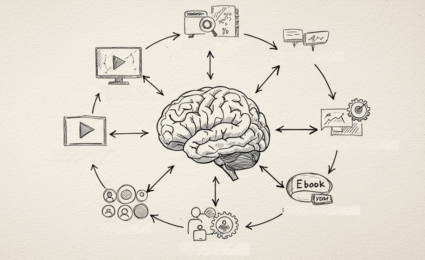Unpacking OpenAI’s Recent Innovations
Unless you’ve spent most of 2023 living under a rock, you’re probably well aware of the rapid evolution of AI. You can’t open platforms like LinkedIn without being bombarded with posts about news from OpenAI and other companies.
Naturally, as a business helping subject matter experts and organisations make an impact using online learning it’s an area of intense interest for us.
The frequency and abundance of AI related information can become like very loud background noise, and it’s often difficult to cut through and pick out what is relevant. But in November 2023, OpenAI (creators of ChatGPT) announced a series of new features that present exciting possibilities for the online learning industry.
Of course, there are many generative AI platforms available, but we believe ChatGPT is currently the most predominant, offering a platform that is the most accessible for those interested in this space.
Let’s delve into these updates and explore how they have the potential to enhance the creation or delivery of online learning experiences.
Copyright Shield
What is it?
A legal framework within AI models to protect generated content from copyright issues.
What are the potential benefits for Online Learning?
OpenAI’s new Copyright Shield safeguards educational content generated via ChatGPT from legal disputes. For example, when creating course materials, you can be assured that AI-generated content is legally protected.
GPT-4 Turbo
What is it?
An new, advanced version of ChatGPT with updated knowledge extending into 2023, offering more accurate and current information.
What are the potential benefits for Online Learning?
Ensures that the content you receive from ChatGPT is up-to-date and relevant.
Retrieval
What is it?
A feature that allows you to upload your own documents, which ChatGPT can then incorporate into its responses.
For example, you can enhance the relevance of AI responses by uploading external information, such as research or case studies.
What are the potential benefits for Online Learning?
The impact of this is huge for training providers. The most obvious application of this is that it can help you to utilise AI to generate more appropriate and informed learning content. But if you use AI inside of your online learning, perhaps as a “course copilot”, you have much more control over how it responds to users.
File Uploads
What is it?
Previously, ChatGPT could only understand typed input, but it now has the capability to read and understand images, documents and other file formats.
What are the potential benefits for Online Learning?
This could potentially allow ChatGPT to help learners understand more technical information.
For example, in a medical training program, ChatGPT could now be used to analyse and explain complex medical studies or reports.
Custom GPTs
What are they?
You’re now able to create your own customised versions of ChatGPT. You can control how they respond, what topics they cover and populate them with your own information (see Retrieval).
These CustomGPTs are also shareable, so you can make these available to others and next year you’ll potentially even be able to monetise them via OpenAI’s new GPT Store.
What are the potential benefits for Online Learning?
Allows for the creation of bespoke, standalone educational tools. For instance, a finance training module could include a Custom GPT that understands specific financial regulations and practices.
CustomGPTs could also become a useful tool to help you to write your own course content, since they are highly customisable and can be made contextual through uploading documents.
Assistants and Assistants API
What is it?
Assistants are quite similar to CustomGPTs. However they have a slightly different purpose and are geared towards those who have their own platforms and tools.
They are capable of retaining conversation history with a user/learner and there is an API available, which allows you to integrate your created Assistants into an external platform or tool.
What are the potential benefits for Online Learning?
Allows you to create customised “Assistants”. These can have their own personas and ways of responding. They are also able to have and store a full conversation history, making them perfect for creating learning scenarios.
We see huge possibilities in using the Assistants API to create immersive learning scenarios to complement your training.
Reduced Fees for ChatGPT Models
What is it?
OpenAI has significantly lowered the prices for using ChatGPT models, making them more accessible and cost-effective for developers and trainers. For example, GPT-4 Turbo input tokens are now 3x cheaper than the previous model.
What are the potential benefits for Online Learning?
This reduction in fees makes it more feasible for training providers to integrate advanced AI capabilities into their courses without incurring high costs. For instance, a small training provider can now afford to use these sophisticated AI models for creating more interactive and personalised learning experiences without worrying about the financial burden.
Integrating AI into Online Learning
These advancements open up new avenues for creating more engaging, relevant, and effective online learning experiences. From up-to-date content to personalised learning tools, the potential to enhance your educational offering is significant.
At Candle Digital we are exploring possible use cases for all of the new features above. In future blogs we will explore our findings, with some case studies and practical examples.
Stay tuned for more!
Fresh insights direct to your inbox
Join the Candle Digital mailing list




